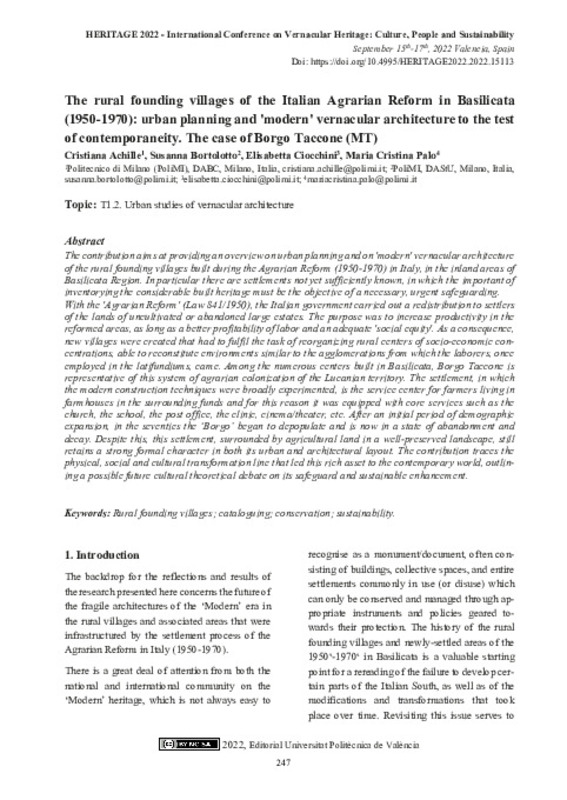JavaScript is disabled for your browser. Some features of this site may not work without it.
Buscar en RiuNet
Listar
Mi cuenta
Estadísticas
Ayuda RiuNet
Admin. UPV
The rural founding villages of the Italian Agrarian Reform in Basilicata (1950-1970): urban planning and 'modern' vernacular architecture to the test of contemporaneity. The case of Borgo Taccone (MT)
Mostrar el registro sencillo del ítem
Ficheros en el ítem
| dc.contributor.author | Achille, Cristiana
|
es_ES |
| dc.contributor.author | Bortolotto, Susana
|
es_ES |
| dc.contributor.author | Ciocchini, Elisabetta
|
es_ES |
| dc.contributor.author | Palo, Maria Cristina
|
es_ES |
| dc.coverage.spatial | east=16.1624774; north=40.7974967; name=Borgo Taccone, MT, Itàlia | es_ES |
| dc.date.accessioned | 2022-11-02T08:26:48Z | |
| dc.date.available | 2022-11-02T08:26:48Z | |
| dc.date.issued | 2022-09-13 | |
| dc.identifier.isbn | 9788413960203 | |
| dc.identifier.uri | http://hdl.handle.net/10251/188971 | |
| dc.description.abstract | [EN] The contribution aims at providing an overview on urban planning and on 'modern' vernacular architecture of the rural founding villages built during the Agrarian Reform (1950-1970) in Italy, in the inland areas of Basilicata Region. In particular there are settlements not yet sufficiently known, in which the important of inventorying the considerable built heritage must be the objective of a necessary, urgent safeguarding. With the 'Agrarian Reform' (Law 841/1950), the Italian government carried out a redistribution to settlers of the lands of uncultivated or abandoned large estates. The purpose was to increase productivity in the reformed areas, as long as a better profitability of labor and an adequate 'social equity'. As a consequence, new villages were created that had to fulfil the task of reorganizing rural centers of socio-economic concentrations, able to reconstitute environments similar to the agglomerations from which the laborers, once employed in the latifundiums, came. Among the numerous centers built in Basilicata, Borgo Taccone is representative of this system of agrarian colonization of the Lucanian territory. The settlement, in which the modern construction techniques were broadly experimented, is the service center for farmers living in farmhouses in the surrounding funds and for this reason it was equipped with core services such as the church, the school, the post office, the clinic, cinema/theater, etc. After an initial period of demographic expansion, in the seventies the ‘Borgo’ began to depopulate and is now in a state of abandonment and decay. Despite this, this settlement, surrounded by agricultural land in a well-preserved landscape, still retains a strong formal character in both its urban and architectural layout. The contribution traces the physical, social and cultural transformation line that led this rich asset to the contemporary world, outlining a possible future cultural theoretical debate on its safeguard and sustainable enhancement. | es_ES |
| dc.format.extent | 8 | es_ES |
| dc.language | Inglés | es_ES |
| dc.publisher | Editorial Universitat Politècnica de València | es_ES |
| dc.relation.ispartof | Proceedings HERITAGE 2022 - International Conference on Vernacular Heritage: Culture, People and Sustainability | |
| dc.rights | Reconocimiento - No comercial - Compartir igual (by-nc-sa) | es_ES |
| dc.subject | Rural founding villages | es_ES |
| dc.subject | Cataloguing | es_ES |
| dc.subject | Conservation | es_ES |
| dc.subject | Sustainability | es_ES |
| dc.title | The rural founding villages of the Italian Agrarian Reform in Basilicata (1950-1970): urban planning and 'modern' vernacular architecture to the test of contemporaneity. The case of Borgo Taccone (MT) | es_ES |
| dc.type | Capítulo de libro | es_ES |
| dc.type | Comunicación en congreso | es_ES |
| dc.identifier.doi | 10.4995/HERITAGE2022.2022.15113 | |
| dc.rights.accessRights | Abierto | es_ES |
| dc.description.bibliographicCitation | Achille, C.; Bortolotto, S.; Ciocchini, E.; Palo, MC. (2022). The rural founding villages of the Italian Agrarian Reform in Basilicata (1950-1970): urban planning and 'modern' vernacular architecture to the test of contemporaneity. The case of Borgo Taccone (MT). En Proceedings HERITAGE 2022 - International Conference on Vernacular Heritage: Culture, People and Sustainability. Editorial Universitat Politècnica de València. 247-254. https://doi.org/10.4995/HERITAGE2022.2022.15113 | es_ES |
| dc.description.accrualMethod | OCS | es_ES |
| dc.relation.conferencename | HERITAGE2022 International Conference on Vernacular Heritage: Culture, People and Sustainability | es_ES |
| dc.relation.conferencedate | Septiembre 15-17, 2022 | es_ES |
| dc.relation.conferenceplace | Valencia, España | es_ES |
| dc.relation.publisherversion | http://ocs.editorial.upv.es/index.php/HERITAGE/HERITAGE2022/paper/view/15113 | es_ES |
| dc.description.upvformatpinicio | 247 | es_ES |
| dc.description.upvformatpfin | 254 | es_ES |
| dc.type.version | info:eu-repo/semantics/publishedVersion | es_ES |
| dc.relation.pasarela | OCS\15113 | es_ES |








